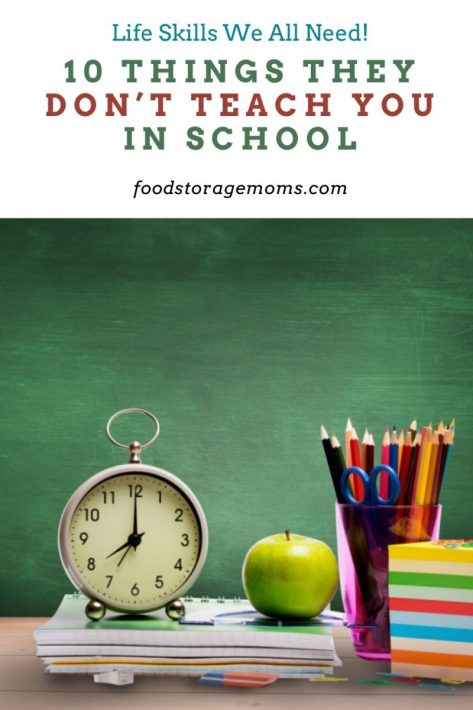
These are at least 10 things they don’t teach you in school that they probably should. Whichever public schooling you received when you were younger, you developed a grasp for math, English, science, art, music, and more while simultaneously learning to get along with others.
You probably even practiced emergency drills and learned a different language or two somewhere along the way. In case you missed this post, Homeschooling: Would It Work For Your Family?
Let’s be honest, though. There are many areas of instruction where the schools failed us when it comes to preparing us for adulthood. A few of us even had to find out the hard way and learn valuable and challenging life lessons on our own. Even if you’re now a full-grown adult, it’s never too late to learn some of those things.
It’s surprising how much our youth are “learning” from the Internet. The challenge is, not all information from online sources are accurate or paint a picture of life as we live it. Much of the information we read is filled with bias or doesn’t present true current facts or even historical reports as things happened. Add the influences of AI, and much of the valuable information that could help us with plans and decision-making is clouded.
Mark recently commented to me that if our dentist was trained to treat issues affecting the health of our teeth in the same manner he was trained to be a banker, we wouldn’t be going to him. Lets discuss some important things we need to know that aren’t taught in school.
10 Things They Don’t Teach You in School

1. Banking
I think it’s safe to say that most high schools and many colleges across the United States don’t have banking as any part of their curriculum, and that’s a darn shame. Think of all the grown adults today who would be better off if they had learned early on how to balance a bank statement, qualify for a car or home loan, and how best to use bank savings and certificates of deposit for a family emergency fund.
Many students have had to learn by making significant financial mistakes because not even their mom or dad took the time to teach them more about personal finances. These are basic banking practices that students and adults need to know how to do:
- Open a checking and savings account
- Understanding interest rates for both deposit accounts and loans and how compound interest works
- Avoiding withdrawal fees
- Filling out a deposit slip
- How money orders work
- Choosing the right bank/credit union
- Learn how to use credit cards to your advantage without getting into too much debt
- Spend less than you make
- If student loans are a good idea and how they work when it comes to paying back the debt
2. Creating a Budget Based on Income
Creating a budget based on income also involves banking, but it deserves a category of its own. Sadly, many adults don’t know how to set up a budget to track their spending and help them get their lives back on track.
Not only does a budget help people manage their money more efficiently, but it also helps them save more for their future. Here’s more info that may help you.
It may seem like a different issue, but learning how to budget your time and apply effective time management skills is vital. Students may feel pressure to set aside the time to study and fulfill school assignments, but the pressure to prioritize time in a work environment can mean the difference between a company being successful or not. That is particularly true when you become a manager and have to not only accomplish your own managerial tasks, but help organize staffing and tasks of subordinates.
3. Filling Out a Resume
Congratulations if you went to one of the few schools in the country that taught you how to write an attractive resume. Mine sure didn’t. A resume is about selling yourself and leaving an impression on businesses and a future boss who doesn’t want to let an opportunity like hiring you pass them by.
Here’s how to write a great resume even if your schooling neglected this critical early step of your adulthood development.
4. Preparing for a Job Interview
Another critical area is preparing for a job interview and knowing how to sell yourself. Again, most schools fail in this area, too. Interviewees need to understand how to:
- Do research ahead of time about the company and how their education and experience may be useful
- Dress appropriately
- Answering their questions correctly with helpful examples
- Asking follow-up questions about the position you’re applying for to show your general interest
5. Completing Your Taxes
It makes no sense why it’s not taught in schools today. After all, almost everyone has to pay their taxes when they grow up, and completing tax forms is part of the process. It can be pretty intimidating, even for those who have been filing them for years. There are online programs like TurboTax to assist people, but it would be great to already know the terminology, how to properly record possible deductions, how deductions and dependents play into tax calculations, and if you qualify for any tax credits.
Schools need to begin educating their students or at least briefly explaining the forms that they will need to complete their taxes, such as their W-4s, W-2s, 1098s for mortgage interest and property tax, 1099s for other income, 1099 NECs if they are self-employed, and other critical information.
6. Public Communications Skills
Most of us in high school took a speech or debate class, where we had to get up in front of the class and discuss or persuade the class about a particular topic. While the instructor may have provided some feedback, they probably didn’t cover all of the public speaking skills that you need to thrive in the workplace, church, civic clubs, and other places that require public speaking.
This also includes the need to communicate your ideas, needs, and challenges in the workplace with co-workers, supervisors, and customers.
For those of you who would like to advance those skills, these are a few examples that you may find helpful and help you deal with the anxiety of getting up and talking in front of others.
7. Posting Appropriately on Social Media
Schools, and especially parents, need to do a better job of discussing this subject with their students. After all, there are negative implications that usually follow when people post inappropriate information or pictures of themselves, whether they’re smoking, drinking, or doing something else that should remain private.
Unless someone steps in, these same students will grow up without respect for themselves or others. It’s my understanding that prospective employers look at social media outlets when determining if you are a “perfect fit” for a job that’s available. Sometimes, future employers may not like what they see on your social media platforms.
8. Writing a College Paper
There are undoubtedly English and writing classes in high school that try to prepare students for what will be expected of them in college. Yet most teachers emphasize how to write a good paper with the proper grammar instead of the things you shouldn’t include, like questionable subject matter.
For those of you who don’t know what sticks out like a sore thumb to college professors when grading your paper, here’s How Not To Write a College Paper.
9. Survival Skills
Unless you were in Boy Scouts or Girl Scouts, or a close relative took you camping when you were younger, there’s the real likelihood that your survival skills are limited. It’s sad to realize that you didn’t learn a minute of it from the classroom. Nobody knows when they need survival skills to get themselves and their family through a dangerous situation.
10. Finding Resources Following an Emergency
While most school systems do a good job teaching children and students about taking shelter during an emergency, how to effectively exit a building on fire, and practicing drills year after year, once they’re adults, they still don’t know where they can find resources to help them get through whatever emergency that they may face.
If they don’t have friends or family to assist them to help them get back on their feet, they may not know where to turn. Here are a few resources you can look into when a natural disaster or other types of emergency has occurred, or better yet, to prepare for before the event.
10 Things They Don’t Teach You in School
Related Topic: 30 Pioneer Skills We Cannot Lose
Final Word
These are 10 things that schools don’t teach that some of you (including me) would have benefited if we had learned them in the classroom. Buying a home, planning for retirement, and learning about investments are notable areas where instruction would have helped us. What other important areas do schools not teach that they ought to? I’d love to hear from you. May God this world, Linda.
Copyright Images: School Supplies Deposit photos_84446982_s-2019
The post 10 Things They Don’t Teach You in School appeared first on Food Storage Moms.
from Food Storage Moms
No comments:
Post a Comment